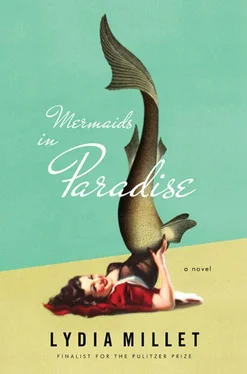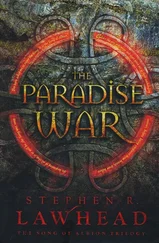“It was how we met,” said Janeane. “I mean, after his experience . We both went to this PTSD encounter group.”
“For post-traumatic stress?” asked Chip. “Hey. So sorry. I know they say they don’t let women in combat, but once you’re out in a war zone that line blurs. Doesn’t it.”
“Oh, she wasn’t in the army ,” said Steve. “Jan eane ?”
“My practice is around peace,” said Janeane. “Sending out empathy for all beings.”
“What happened was, a therapist told her the phobia had features in common with PTSD, so she started going to the group. I was helping to moderate that day.”
“It was a new horizon,” said Janeane, smiling. “Plus I met Steve!”
Now, in the tropical dusk, Janeane was back in their cabana, resting and making all of us a late dinner; she didn’t like to eat out much. In the resort’s restaurant, she’d said, and the various restaurants off-campus too, there was always the chance of a bludgeoning. Especially now, after this, she was reluctant to emerge. She’d be picking at an overpriced entrée, she’d said, fingering the stem of a goblet, and then suddenly see, in her mind’s eye, a machete intruder.
Standing there on the dock, we wondered where Riley the videographer had gone. We hadn’t seen him since he told us the footage had been stolen; he’d said he was going straight to the police, to tell them about his camera. He’d promised to be here to welcome the Berkeley anthropologist, but he was nowhere to be seen and didn’t answer Chip’s calls or texts.
We worried about the Berkeley anthropologist, too — what he might say, without a video. He’d probably think he’d made the arduous and, let’s face it, expensive trip for nothing. It was no joke, flying from California to the Caribbean on a last-minute ticket. And if he turned out to have been close to Nancy, worse yet — for then, of course, there’d also be the grief. We couldn’t recall if she’d said they’d been friends or only colleagues.
The three of us watched the white prow of the ferry as it first appeared — it’s not a large ferry, really, mid-sized at best — and the lights of the harbor around us twinkled in the gathering dark.
“I like ferries,” mused Chip, and squeezed my hand.
“We came in by chopper,” said Steve. “I don’t do boats. Not anymore. No boats of any kind, not even a rowboat. I’ll never set foot on a ship again until the day I die.”
“Do you get seasick?” asked Chip.
“Not at all,” said Steve.
Chip and I waited politely, but he didn’t go on.
The ocean and horizon were dim purple shades, and the lights on the ferry twinkled — though way more dimly than the lights of the resort at our backs. Then we saw another light, the light of a second, smaller boat as it approached the ferry from one side.
“That’s a police boat,” said Steve. “The BVI police cutter. Or maybe it’s the Coast Guard. I’m not sure the Brits even have their own boats.”
To our surprise the two ships met. We couldn’t tell if the ferry slowed or stopped; it seemed to remain static until the police boat moved away again, off to somewhere we couldn’t see. After that it grew nearer steadily.
“I’ve got a bad feeling,” said Chip.
And sure enough, when the ferry reached us at the dock tourists streamed off — mostly couples, a few singletons with bulging shopping bags, the odd kid holding hands with a tired-looking parent — but there was no Berkeley anthropologist. We thought at first he might have been camouflaged among the day-trip shoppers, and Chip approached one or two, but we got no love from them.
“Do you think,” I asked the guys, when the last of the passengers had disembarked and we were still standing there lamely, “that police cutter could have had something to do with it? With the fact that he never arrived?”
Steve looked at me, and I saw it in his eyes: he did.
“I don’t get it,” said Chip, as we walked slowly back down the dock, slumping. “If the police boat intercepted the ferry to meet the anthropologist — I mean if ; he could have just missed his plane. But first off, why would they? How would they even know he was coming?”
“They have her phone,” I suggested. “I’m sure they do. So they can access her voicemail, her texts and her email, no problem. That’s my bet. She probably unlocked her phone, since she was using it so much.”
“But why would they want to intercept him? I mean he’s not a suspect or anything.”
“And the cops around here are kind of a joke,” said Steve. “I researched it, you know — because of the phobia. Our assumption was, in this kind of tourist economy, good cops would actually be a bad sign, in terms of the likelihood of violent crime. The Virgin Gorda cops have to call in the troops from other islands when something serious goes down. I can’t see them doing anything they didn’t have to do.”
“Who does have the power on the islands?” I asked Steve. “Do you know?”
Steve shook his head.
“ Is there power?” he asked naïvely.
“There’s always power,” I said. You’d think a Freudian would know that better than anyone, but I kept my mouth shut on that point. “The question is who has it.”
“Whoever has the money,” shrugged Chip. “Right?”
We stepped off the dock and onto the white sand; we looked up at the buildings of the resort in front of us, stretching far out to the sides, along the beach, and quite a ways back, to where the soft hill of the park began to rise. We felt the comforting shape of their well-designed spaces, their welcoming lights.

BACK AT THE Steve/Janeane cabana, the two men and I sat on the back porch and Janeane brought out a brownish pile of hippie-style grain, mounded low and flat on the serving plate like a dormant volcano. We all felt worried and restless, so the mood wasn’t great; soon after she sat down and we all began to eat, we were interrupted by a crisp knock on the cabana’s front door. I flashed back to that morning, when Steve had knocked on our own door and brought me news of death. Then I abandoned my fork and ran to answer the summons, admittedly relieved to be clear of my quinoa mountain.
There stood someone I’d never seen before, a young guy dressed in business casual — I’d almost say dapper, except his tan was a few shades too deep. It crossed the fine line between handsome and pleather.
“Hey there — Mike Jantz,” he said, or it might have been Jans or Jams, the exact name was one of those small slivers of knowledge that slips through your fingers forever. “I’m with Paradise Bay Guest Services. Good evening!”
“What’s this about?” said Chip, coming up behind me — he too, I think, was eager to escape the quinoa.
“You must be our newlyweds in the Star Coral Cabana, am I right?”
At Paradise Bay all the cabanas have names; ours was Star Coral, the Freudian’s was Pearl Diver.
“That’s us,” said Chip, and cocked his head. “How did you know?”
“We try to give all our guests a caring, very personal service. I make sure I always know who’s who.”
“That’s nice,” said Chip, putting a hand on my shoulder.
“I apologize for interrupting your dinner,” said the tanned man. “It’s delicate, but we at Paradise Bay want to bring together all those who were associated with Dr. Simonoff, who, as you know, has passed away. We want to make sure the guests who were associated with Dr. Simonoff are kept in the loop — that everything is done, from our end, to make sure your needs are met at this upsetting time.”
Читать дальше













